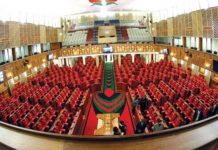AfricaPress-Kenya: Judges who were appointed from private practice are still earning salaries that are lower than their counterparts who were promoted from within the Judiciary. Judicial Service Commission (JSC) and Salaries and Remuneration Commission (SRC), have disobeyed court orders requiring them to march the salaries of judges.
On December 18 last year, Justice George Odunga ordered the commission to harmonise salaries of all the affected judges and backdate the same to the date each was appointed.
Justice Odunga has again ordered JSC and SRC to honour the court orders after finding that the aggrieved judges who sued through an activist Sollo Nzuki had a legitimate claim to warrant the court to force the two commissions to act.
“In the premises, I hereby issue an order of mandamus compelling the first respondent herein to implement and effect the decree regarding the judgment of this court second respondent is similarly directed to take the necessary steps within its mandate to facilitate the satisfaction of the said decree,” the judge ruled.
In the case, Nzuki through his lawyer Cecil Miller noted that the commissions never appealed the verdict but remained quiet. JSC in its reply explained that it was the work of SRC to determine how much judges should earn while it was only required to identify those who are affected and how much they ought to be paid.
SRC did not respond.
Judges who joined the bench from private practice earn Sh532,500 per month and a non-practising allowance of Sh13,500. On the other hand, a magistrate who becomes a judge takes home Sh632,000 and a similar allowance.
On December 18, Justice Odunga ruled that it was discriminatory for lawyers appointed to the bench from private practice to get lower pay than those promoted from within the Judiciary, and ordered the Salaries and Remuneration Commission to harmonize their pay.
“Being an appointment, whether one comes from within or outside the Judiciary, they are at par in so far as their remuneration is concerned. None should be disadvantaged based on where he or she comes from,” he ruled.
Odinga said creating a disparity between those serving in the Judiciary and those not serving gives an added advantage to those already in the judicial system without any legal basis.
His decision was a relief for judges who were appointed from legal practice after the promulgation of the 2010 Constitution. The Judge agreed with the submissions and declared that paying a salary lower than those promoted from magistrates court is unconstitutional.
“Judges, whether appointed from within the Judiciary or outside perform similar tasks. There is no intelligible differentia, which distinguishes a judge recruited from within the Judiciary and one recruited from outside the Judiciary,” he ruled.
Further, he stated that failure to harmonise the remuneration of judges, the SRC is abdicating its constitutional and statutory mandate.
Justice Odunga ruled that remuneration and benefits payable to judges was constitutionally ring-fenced and should not be varied to disadvantage some.
“A judge whose post-retirement is uncertain is bound to be exposed to many unethical things,” ruled Odunga.
The Judge said having indefinite packages for judges may expose them to external interference.






